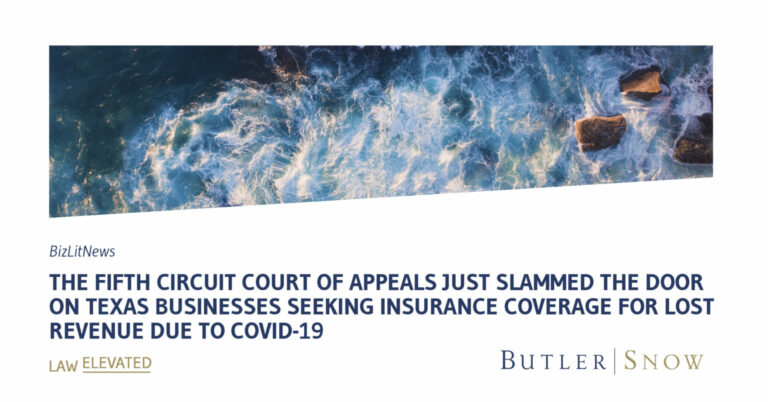In a pair of opinions issued last month, the Fifth Circuit Court of Appeals held that Texas businesses’ COVID-19 related income loss was not covered by standard business income and extra expense (“BI/EE”) endorsement in commercial property insurance policies. Terry Black’s Barbeque, L.L.C v. State Automobile Mutual Insurance Co., 22 F.4th 450 (5th Cir. 2022); Aggie Investments, L.L.C. v. Continental Casualty Co., No. 21-40382, 2022 WL 257439 (5th Cir. Jan. 26, 2022). In doing so, the Court followed seven other circuits, which held that such business income loss did not trigger coverage under similar BI/EE endorsements because the insureds did not claim any “direct physical loss” of property. Terry Black’s, 22 F.4th at 456 (listing cases from the Second, Sixth, Seventh, Eighth, Ninth, Tenth, and Eleventh Circuits).
The first of these cases, Terry Black’s, involved two barbeque restaurants in Dallas and Austin, which were forced to shut down their dine-in services due to county COVID-19 orders and they suffered business income losses as a result. Id. at 453. Both restaurants were insured by separate but identical commercial property insurance policies, which contained BI/EE coverage for losses incurred during the “necessary suspension of [the insured’s] operations during the period of restoration.” Id. However, the coverage was only triggered by a suspension of operations “caused by direct physical loss of or damage to property at the premises.” Id. After the insurer denied coverage for the restaurants’ business income loss, the restaurants sued seeking coverage under the BI/EE endorsement, and the insurer moved for judgment on the pleadings as there was no allegation of “direct physical loss.” The restaurants argued that the loss of the intended use of their dining areas was a “physical loss” of the property. The district rejected that argument and dismissed the restaurants’ claims. Id. at 454.
The Fifth Circuit agreed, holding that “direct physical loss” of property, required a “tangible” “deprivation” of the covered property under Texas law. Id. at 456-57. The Court further noted that the endorsement’s coverage during the “period of restoration,” which lasted from the date of the loss to the date that the property was “repaired, rebuilt, or replaced,” further supported the requirement that the loss of property be tangible. Id. at 456. Accordingly, because “[n]othing physical or tangible happened to the [] restaurants at all,” the plaintiffs had “ownership of, access to, and ability to use all physical parts of its restaurants at all times,” and the “prohibition on dine-in services did nothing to physically deprive [the plaintiffs] of any property at its restaurants,” the BI/EE coverage was not triggered and the district court’s dismissal was affirmed. Id.
Three weeks later, the Fifth Circuit issued its opinion in Aggie Investments, which involved a McKinney tea and spice gift shop that was covered by a substantively identical BI/EE endorsement. Aggie Investments, 2022 WL 257439 at *1. Attempting to distinguish its losses from those in Terry Black’s, the shop argued that there was a tangible deprivation of its property because it was forced to shut down its operations entirely due to McKinney’s shelter-in-place order and restrictions on non-essential retail businesses. Id. at * 2. But the Court rejected that distinction, holding:
Whether a business is directed to cease one kind of service or all of its services, that order is not a tangible alteration or deprivation of property. Nothing tangible happened to Aggie Investments’ property. It is therefore not entitled to coverage.
Id. In short, absent an unlikely contrary ruling by the Texas Supreme Court, Texas businesses no longer have any hope of recouping their COVID-19 income losses through standard commercial property business income endorsements.
